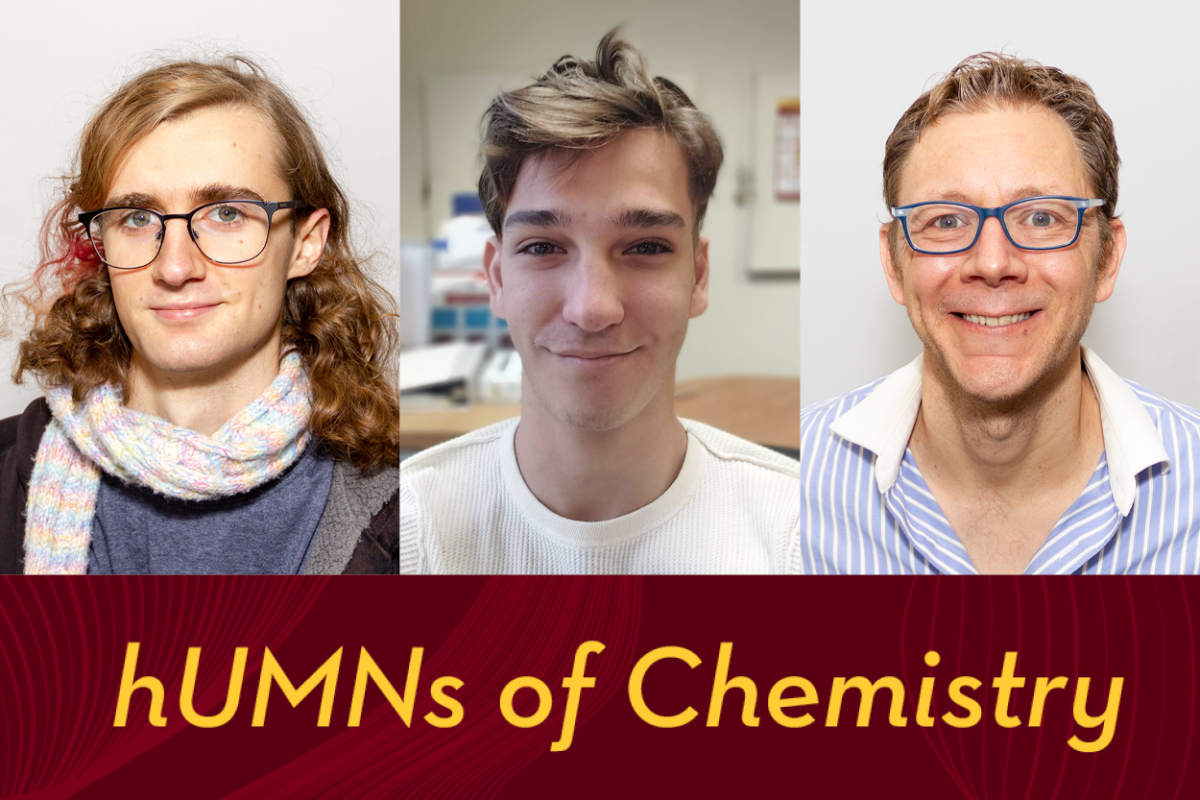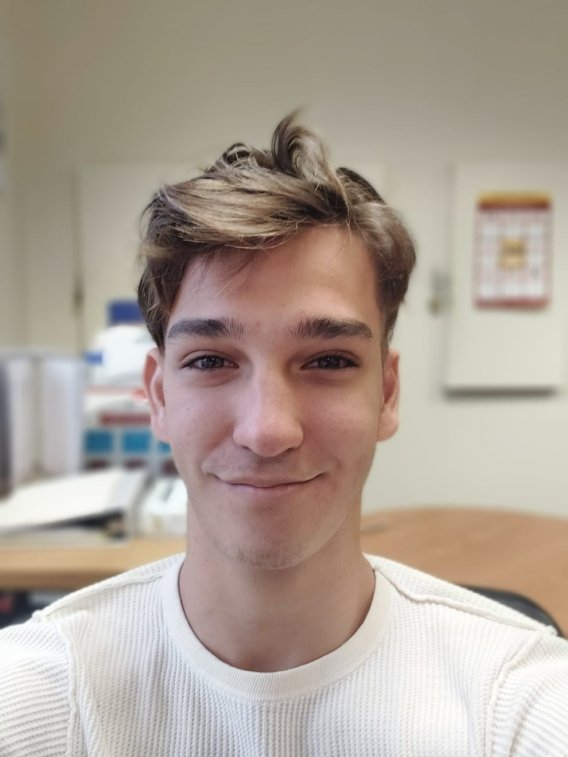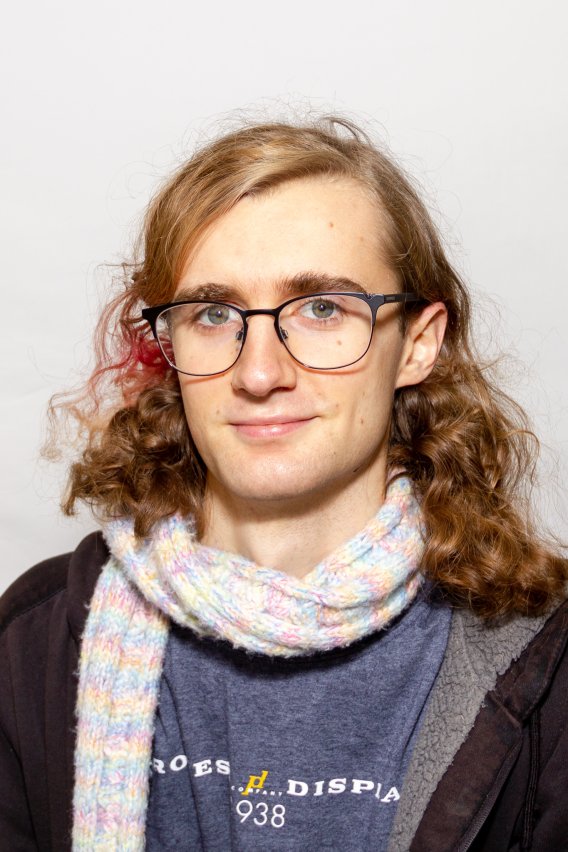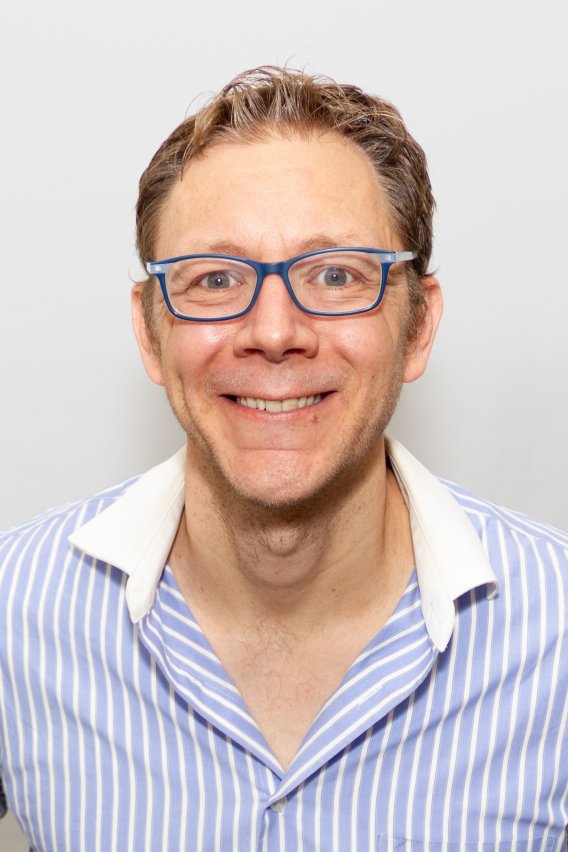hUMNs of Chemistry #10


Lourenco Braga
He/Him
Front Desk Assistant
Tell us about your journey to the University of Minnesota.
Going on an exchange program to Canada made me realize I wanted to study abroad. During the pandemic, I saw the places I wanted to apply to and my first desired college was the UMN, due to its position in the global Chemistry ranking, research opportunities and welcoming campus. I left Brazil in Spring 2022 and started my education here. I was iffy at first due to the horrible winter, but now I consider this place my home.
How did you decide to work in the Chemistry front office? What do you like about it?
I wanted to do some sort of work relating to Chemistry, but not necessarily involving chemicals. When I saw this opportunity, I figured it was a perfect chance to work with the chemistry department, get to know my class, professors, and opportunities, and learn about chemistry as a whole. I love the environment here because my two bosses, Mollie and Chuck, are easy-going, funny and welcoming.
Do you have a background in or like chemistry? Tell us about what you're studying!
I'm a Chemistry major so I've been studying since I got here and even before. I started in high school and it was my favorite subject.
What do you hope to contribute to the chemistry community at the University?
I want to contribute with research (my dream job) and cure cancer. I am in a lab that studies cells and biochemical processes, which I believe will help me achieve my goal.
What's something you're always down to chat about when people stop by the front office?
Anything. I am down to talk about anything
What’s your favorite piece of chemistry/science pop culture media? Why do you love it?
Doctor Who. Love how confusing the timelines are and it breaks my brain.
What do you do outside of the classroom/lab/office for fun?
Hang out with friends, go out for dinner, sports, rock climbing, playing cards and boardgames, etc.
Where is your favorite spot in the Twin Cities?
My room.
Tell us about who makes up your household (including pets).
My room is so empty I only have a bed and a rocket.
Are there any family or cultural traditions you want to share with our community?
Yes. In Brazil, we are always open to meet new people. This has to be part of Minnesotan culture.

Cal Mergendahl
They/She
Graduate Student, Kass Group
What advice do you have for incoming chemistry students?
The best advice I can give incoming chemistry grad students is to talk to older students as early and often as possible. Nobody knows everything about how to succeed in grad school or about how the department operates, but just about everyone knows something, and by and large, we want to see you find the path to a good grad school experience while avoiding the mistakes we might have made on our own journeys.
Tell us about an important mentor in your academic life?
Big shout-out to both my high school chemistry teacher, Ms. McLaughlin, for helping me realize that I had a passion for chemistry and encouraging me to give my best in it, and my undergrad research advisor, Dr. Alyssa Pirinelli, for giving me opportunities to grow as a scientist while also demystifying graduate school for me and helping me know what to look for (and what to avoid). I'd also like to thank Dr. Dan Blechschmidt for getting me started in the Kass lab and setting me up for success in my research.
What are your plans after graduation?
I've got a little ways to go before I need to have a really solid answer to that question, hopefully, but I'm interested in academia - both teaching and research have been really enjoyable for me and I'd like to be able to keep up a good balance of both as much as I can!
What do you hope to contribute to the chemistry community at the University?
One of the most jarring things for me in coming to grad school was going from an environment where I could be around other trans and gender non-conforming people pretty much constantly to joining a department where I sometimes feel quite lonely in my identity. I feel fortunate to be in a department where people are generally accepting, but there's always more work to do in building a community where folks like me can feel less isolated and more respected in who we are.
Where is your favorite spot in the Twin Cities?
It's hard to pick just one, but apart from "everywhere I can get to on a bike", I've definitely got a soft spot for Tower Hill Park. It's not too far from my house, and when I need to get out and clear my head, it's always nice to go up to the overlook and see the skyline.

Professor William C. K. Pomerantz
He/Him
Merck Professor of Chemistry Co-Director of the NIH Chemistry Biology Interface Training Grant
Tell us about your journey to the University of Minnesota.
My path to obtaining an advanced degree or becoming a professor was never clear nor well planned out. While my dad never completed his college degree and my mother received her college degree when she was in the convent , I did benefit from having amazing mentors at Ithaca College, a small primarily undergraduate institution in upstate New York. Here, I graduated as the only chemistry major that year, although I was unsure of a career direction. Given my proficiency in German and a strongly supportive research mentor, Heinz Koch, I applied and was selected to be a Fulbright Fellow at ETH Zürich working with François Diederich and Jack Dunitz. That was a formative year, cementing my love of organofluorine chemistry and molecular recognition. I fortunately applied to graduate school that year to Wisconsin-Madison after realizing it wasn’t a branch campus, and worked with chemist Sam Gellman and a chemical engineer Nick Abbott on a self-assembling peptide project for design of liquid crystalline materials. Having never touched a protein before, nor interfaced significantly with a biological project, I applied to a chemical biology lab at the University of Michigan with Anna Mapp focusing on design of synthetic transcription factor mimics. Given the challenges of working with transcription factors (read as many failed experiments), I ultimately leaned on my experience and love of organofluorine chemistry and NMR and devised the idea for the protein-observed fluorine (PrOF) NMR experiments that I would then bring with me to Minnesota to start my career.
We would love to hear more about your research! What do you hope to accomplish with this work? What is the real-world impact for the average person?
Two areas of research currently underway in our lab that we are passionate about are our chemical biology research program in developing new epigenetic therapies and a new research direction which we term sustainable organofluorine chemistry.
Epigenetics is a fascinating lens for looking at how genes are expressed to give every cell type in our body a distinct identity despite every cell possessing exactly the same genetic information. We seek to reprogram cells containing dysfunctional epigenetic proteins. Our epigenetics program originated from our PrOF NMR drug discovery studies and have led us the develop highly selective inhibitors of proteins involved in inflammation and cancer. Our most advanced studies are with the Mayo Clinic for developing a new approach to treat alcoholic hepatitis which we hope to someday translate to clinical trials, and with St. Jude Children’s Research Hospital for inhibiting a new protein target, called BPTF, as a potential therapeutic approach for pediatric cancer.
In the context of sustainable fluorine chemistry, we have had a vibrant collaboration with Prof. Bill Arnold, in the department of civil and environmental engineering in CSE. Here we have been using our quantitative fluorine NMR approach to 1) study the degradation pathways of bioactive fluorinated molecules to understand how to redesign molecules that would be less persistent in the environment, 2) quantify the level of polyfluorinated alkyl substances (PFAS) in the environment and 3) ultimately find new ways to capture and degrade harmful PFAS. Given the outsized footprint PFAS materials have on our everyday life, I have derived a lot of fulfillment from this project as we search for better ways to handle these molecules and design alternatives.
What courses do you teach? What can students expect to get out of your course?
I have taught a variety of courses related to organic chemistry and chemical biology. For undergraduates I have taught the first and second semesters of organic chemistry (CHEM 2301 and CHEM 2302) and the advanced chemical Biology Lab (CHEM 4423W). For graduate students I have taught our CHEM 8411 Introduction to Chemical Biology Course and guest lecture on topics related to NMR in drug discovery and epigenetics in the medicinal chemistry curriculum. These courses are grounded in teaching fundamental rules of structure and reactivity as they pertain to organic molecules, and how we can use these principles to address pressing questions in biology. I love engaging with students and teaching this exciting subject material, as they remain some of my favorite topics. Students can expect a passionate faculty member, ready to connect with his students, and hoping to foster a love of the discipline. My newest course that I am developing is a 1 credit course focusing on teaching scientific communication skills for our majors through piloting out a new “Write like a Chemist” course next spring.
What do you do outside of the classroom/lab/office for fun?
I’m a total coffee geek, and love scouring new places for interesting new coffee shops, learning about coffee and the industry, and roasting coffee for friends. Having grown up in Pittsburgh, I’m also a Steelers super fan. I also dream of getting back to the wrestling mat, but that might still be a pipedream.
What was your very first job?
I worked at a small nursery, called Shrubs and Stuff for 2 and half years. Before learning how to operate a Bobcat front loader and forklift, I spent most of my day working in the mulch and manure pit.
Where is your favorite spot in the Twin Cities?
Prohibition, at the top of the Foshay Tower, Fun cocktails and a great view.